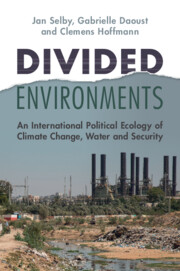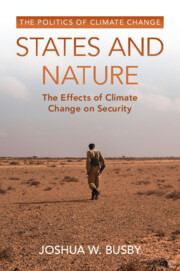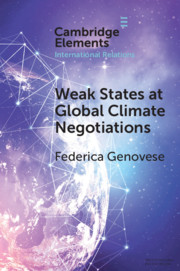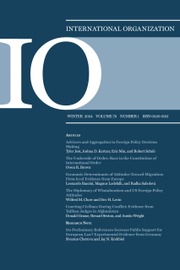Divided Environments
An International Political Ecology of Climate Change, Water and Security
£26.99
- Authors:
- Jan Selby, University of Sheffield
- Gabrielle Daoust, University of Northern British Columbia
- Clemens Hoffmann, University of Stirling
- Date Published: September 2022
- availability: Available
- format: Paperback
- isbn: 9781009107600
£
26.99
Paperback
Other available formats:
Hardback, eBook
Looking for an inspection copy?
This title is not currently available on inspection
-
What are the implications of climate change for twenty-first-century conflict and security? Rising temperatures, it is often said, will bring increased drought, more famine, heightened social vulnerability, and large-scale political and violent conflict; indeed, many claim that this future is already with us. Divided Environments, however, shows that this is mistaken. Focusing especially on the links between climate change, water and security, and drawing on detailed evidence from Israel-Palestine, Syria, Sudan and elsewhere, it shows both that mainstream environmental security narratives are misleading, and that the actual security implications of climate change are very different from how they are often imagined. Addressing themes as wide-ranging as the politics of droughts, the contradictions of capitalist development and the role of racism in environmental change, while simultaneously articulating an original 'international political ecology' approach to the study of socio-environmental conflicts, Divided Environments offers a new and important interpretation of our planetary future.
Read more- An original interpretation of the past, present and future of climate and water security
- Organised thematically but including detailed analysis of five different country/regional case studies
- Articulates a new 'international political ecology' approach drawing on insights from political ecology and International Relations
Reviews & endorsements
'Political ecology is going international! In this path-breaking book, the authors demonstrate beyond reasonable doubt how environmental conditions, in particular water and climate, co-shape international political (in)security. Drawing on the traditions of political ecology and international relations, the authors carefully weave a tapestry of sophisticated conceptual argumentation and detailed empirical analysis that opens the way for an urgently needed international political ecology. Divided Environments should be taken very seriously indeed by anyone concerned with how environmental conditions intersect with questions of political power, inter-state relations and socio-ecological (in)security.' Erik Swyngedouw, University of Manchester
See more reviews'Divided Environments is engaged scholarship of the highest order and significance. Analytically rigorous and grounded in five illuminating case studies, the book challenges the racist stereotypes, alarmist policy narratives and simplistic scarcity models that have dominated the climate, water and security field to date. Step by step, theme by theme, the authors articulate an international political ecology that puts into dynamic interplay processes of resource extraction, capitalist expansion, state-building and environmental change. Clearly written and convincingly argued, Divided Environments is essential reading for those seeking a clearer understanding of the complex relationships between environment, development, conflict and climate change.' Betsy Hartmann, Hampshire College
Drawing on five rich empirical cases, Divided Environments offers necessary clarity and excellent insights into the murky and often intentionally skewed debates around climate change, water and security. It should be read by anyone involved in the powerful politics around climate and water (in)security, as well as scholars of political ecology, environmental governance and geography. Farhana Sultana, Syracuse University
'What Selby and co-authors achieve in this book is of the greatest importance. They decisively expose the naivety of climate reductionism, so evident in popular accounts of climate conflicts and water wars, and replace it with a framework of understanding they call 'international political ecology'. Their argument is richly and authoritatively grounded in five regional cases drawn from the Middle East and north Africa. This is work of the highest scholarship, with huge significance for how we should think, talk and act about the risks of climate change.' Mike Hulme, University of Cambridge
'A treasure of a book.' Robert Vitalis, University of Pennsylvania
'Drawing on political ecology, this illuminating study unveils the security implications of water development and climate change in Cyprus, Lake Chad, Palestine, South Sudan and Syria, and traces how the legacies of colonialism, violent capitalism, racialised development and predatory states, rather than climate change, drive environmental vulnerabilities and conflict. A critical counter-narrative to mainstream discourse on climate security, and a highly recommended contribution to the debate about water resources and conflict.' Marwa Daoudy, Georgetown University
'Divided Environments is a much-needed critical analysis of the idea that climate change causes conflicts, that demonstrates how this idea is empirically flawed and rooted in Eurocentric myths about colonised people and their environments.' Tor A. Benjaminsen, Norwegian University of Life Sciences
'This is a book that will make people sit up and think.' Mark Zeitoun, University of East Anglia
'For International Relations to productively contribute to the climate challenge, scholars in the field must interrogate the assumptions and oversimplified analyses which are frequently attached to climate security and climate change politics. This important book highlights and corrects key climate-related claims and is a must-read text for not only climate change activists and policy-makers but for all IR researchers!' Milja Kurki, Aberystwyth University
Customer reviews
Not yet reviewed
Be the first to review
Review was not posted due to profanity
×Product details
- Date Published: September 2022
- format: Paperback
- isbn: 9781009107600
- length: 300 pages
- dimensions: 228 x 152 x 19 mm
- weight: 0.53kg
- availability: Available
Table of Contents
Preface:
1. Introduction
2. Geography versus demography
3. Drought
4. Others
5. Hydraulics
6. Frontiers
7. War
8. Peace
9. Transformations and circulations
10. Conclusions.
Sorry, this resource is locked
Please register or sign in to request access. If you are having problems accessing these resources please email [email protected]
Register Sign in» Proceed
You are now leaving the Cambridge University Press website. Your eBook purchase and download will be completed by our partner www.ebooks.com. Please see the permission section of the www.ebooks.com catalogue page for details of the print & copy limits on our eBooks.
Continue ×Are you sure you want to delete your account?
This cannot be undone.
Thank you for your feedback which will help us improve our service.
If you requested a response, we will make sure to get back to you shortly.
×







